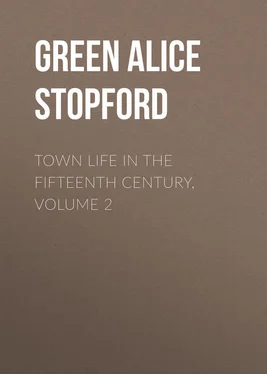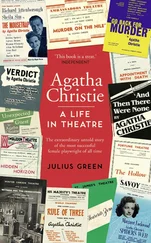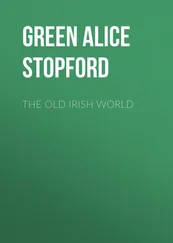Alice Green - Town Life in the Fifteenth Century, Volume 2
Здесь есть возможность читать онлайн «Alice Green - Town Life in the Fifteenth Century, Volume 2» — ознакомительный отрывок электронной книги совершенно бесплатно, а после прочтения отрывка купить полную версию. В некоторых случаях можно слушать аудио, скачать через торрент в формате fb2 и присутствует краткое содержание. Жанр: literature_19, foreign_antique, foreign_prose, Историческая проза, на английском языке. Описание произведения, (предисловие) а так же отзывы посетителей доступны на портале библиотеки ЛибКат.
- Название:Town Life in the Fifteenth Century, Volume 2
- Автор:
- Жанр:
- Год:неизвестен
- ISBN:нет данных
- Рейтинг книги:5 / 5. Голосов: 1
-
Избранное:Добавить в избранное
- Отзывы:
-
Ваша оценка:
- 100
- 1
- 2
- 3
- 4
- 5
Town Life in the Fifteenth Century, Volume 2: краткое содержание, описание и аннотация
Предлагаем к чтению аннотацию, описание, краткое содержание или предисловие (зависит от того, что написал сам автор книги «Town Life in the Fifteenth Century, Volume 2»). Если вы не нашли необходимую информацию о книге — напишите в комментариях, мы постараемся отыскать её.
Town Life in the Fifteenth Century, Volume 2 — читать онлайн ознакомительный отрывок
Ниже представлен текст книги, разбитый по страницам. Система сохранения места последней прочитанной страницы, позволяет с удобством читать онлайн бесплатно книгу «Town Life in the Fifteenth Century, Volume 2», без необходимости каждый раз заново искать на чём Вы остановились. Поставьте закладку, и сможете в любой момент перейти на страницу, на которой закончили чтение.
Интервал:
Закладка:
It has been commonly held, however, that the old trade laws were not only invented to protect the people’s food, but to protect wages and profits as well; and they have been denounced as the outcome of an ignorant selfishness; and as proving the belief of the mediæval burghers that the industrial prosperity of the whole community could only be assured by their securing so complete a monopoly of the entire trade of the borough that they might themselves reap all the fruit of their enterprise and gather wealth undisturbed – a belief to which modern democracies (with one great exception) still cling, though they throw a grander air over their creed now-a-days by discussing protection in continents instead of protection in a little market town. But it seems likely that protection in the modern sense had scarcely anything to say to the great mass of mediæval legislation about trade. No doubt it was the natural ideal of every craft to have the State for its nursing-mother; but the voice of the crafts was lost in the monotonous reiteration by the general public of their dominant principle, that manufactures and commerce only existed for the benefit of the whole community – the “poor commons of the realm,” to use the phrase of that day. It was for their protection that no unlicensed or unregulated trade should be allowed to exist, that there should be no fraudulent manufactures, no secret breaking down of barriers set up by Parliament for the orderly division and control of crafts, no buying and selling by forestallers, public enemies to the community and to the country, hastening by land and by water to oppress the poor; [98] See Collectanea (Oxford Hist. Soc.), ii. 49.
and rules devised to check a public mischief or secure a public good are no more to be classed as protective than regulations for the sale of drugs or the licensing of public houses in our own day. Such rules indeed were often as unsolicited by the trader as they were agreeable to the public, and all his cunning was exerted to elude them. Some little margin of profit was to be won beyond the city boundaries where there was freedom from the city law and from the city tolls. Therefore the London corporation complained that the butchers of London “who have bought their freedom and are sworn of the franchise, do rent their houses at Stratford and round Stratford, and never come at any summons nor bear their part in the franchise of the city; but shut out the citizens (resident butchers) in divers markets where they ought to buy their wares, so that through them no wares they can get to the great undoing of the citizens.” [99] Riley’s Mem. 180.
Bakers withdrew themselves “into the foreign” to avoid punishment for frauds. [100] Ibid. 181.
Candlemakers established themselves in the suburbs, and butchers were presented “for selling of his tallow into the country and will not sell it to a man within the town,” [101] Nottingham Records, iii. 354. Hist. MSS. Com. ix. 172-5. Ibid. v. 531.
or for carrying tallow in sacks at night out of the city for the making up of candles; and being punished were ordered to leave candle-making to the chandlers, who on their part were commanded to keep within the boundaries. In Canterbury, where owing to the great number of ecclesiastical tenants the main burden of taxation was thrown on a part only of the population, and where doubtless taxes were correspondingly high, there came a time at last when traders of every kind, cloth-makers and brewers and bakers, carried their business outside the “liberties,” so that according to the story of the mayor and council “formerly there were divers and many habitations in which of time past were kept good and notable households, by the which many men and women were relieved and had their living and increase, being now uninhabited and greatly decayed, and some of them fall to ruin and utter destitution … and it is well understood and known that the principal cause thereof” was this wicked device of the independent dealers, by which the tradesmen in the city who had to pay “tax, tallage, and other impositions,” could not compete with those outside and “have not the sale and utterance of their bread and ale, as they in times past have had, to their great impoverishing, and manifold hurt and prejudice to the commonweal of the said city.” The suburban bakers sold their goods to “divers and many simple and evil disposed persons of the city as well to Scots, Irish, and other, which in no wise will apply themselves to any labour or other lawful occupations, but only they live upon sale and huckstry of the said bread, beer, and ale, and for that they have resorting unto them many vagabonds … whereby many well disposed persons be greatly annoyed and grieved.” [102] Preamble of Canterbury regulations for brewers and bakers drawn up in 1487. (Hist. MSS. Com. ix. 173.)
To restore trade to its primitive simplicity a law was passed with clauses against the mercenary Scotch and Irish, the troublers of the city’s peace, and dealers were forbidden to sell their provisions “to no inhabitant within the said city, but only to such persons as shall be thought by the mayor and aldermen of good disposition and conversation.” [103] Ibid. For suburban trades see girdlers and embroiderers in London. (Schanz i. 608. Rolls Parl. iv. 73.)
The prejudice against unregulated trade was no doubt reinforced by the hostility of the town dealer to competitors who throve at his expense on illegal profits; but it was probably the governing body of the town which maintained the most serious opposition to all traffic that depended on the cheating of the common treasury of the borough. [104] For the attempt at free trade in Winchester in 1430, following the example of Coventry and New Sarum, see Gross, ii. 261. Another rule of the assembly in the same direction was passed in 1471, apparently in the attempt to find a new source of income for payment of the ferm. Ibid. 262.
For no trifling part of the town revenue came, as we see from the Nottingham records, from fines paid yearly by non-freemen for the privilege of holding a stall in street or market. In Canterbury “Tollerati” paid for the right of buying and selling during a limited period, and at the end of the time renewed the right by a fresh payment of what was called “Tolleration money”; [105] Muniments of Canterbury. In Southampton there was a class of Out-burgesses who did not live in the town; they were allowed to vote for a mayor and members of Parliament, but might not be present at a common council. (Davies’ Southampton, 197.)
alien traders living without the liberties, there known as “intrantes,” took in Romney the name of “extravagantes.” Some towns shewed a jealousy of strangers, dictated no doubt by special circumstances; as in Preston, where the “Foreign Burgesses,” as distinguished from the “Inn Burgesses,” were drawn from the country gentry and squires and some inhabitants of the town, [106] Preston Guild Rolls, xvi. xx.
and were merely freed from toll [107] For breach of this custom see Rep. on Markets, 57 (Wallingford), 60-61. (Bosworth, Lafford.)
for any goods bought for the use of their families, but were allowed no other profits of trade, and even though they were inhabitants had no right of common on marsh or moor, nor could they join in the election of any town officer nor be themselves elected; [108] Preston Guild Rolls, xii.
while even with these restrictions no trader who lived outside the walls was admitted among them, [109] Ibid. xii. xxiv. xxix. xxx.
and it was only in course of time that alien dealers were gradually allowed on payment of a fine to set up stalls in the market-place and carry on their business under the name of “stallingers.” In general, however, an open purse was all that was needed to commend a stranger; and if the charge on it was sometimes excessive it seems to have been enforced mainly as a means of persuasion to enter the Merchant Guild.
Интервал:
Закладка:
Похожие книги на «Town Life in the Fifteenth Century, Volume 2»
Представляем Вашему вниманию похожие книги на «Town Life in the Fifteenth Century, Volume 2» списком для выбора. Мы отобрали схожую по названию и смыслу литературу в надежде предоставить читателям больше вариантов отыскать новые, интересные, ещё непрочитанные произведения.
Обсуждение, отзывы о книге «Town Life in the Fifteenth Century, Volume 2» и просто собственные мнения читателей. Оставьте ваши комментарии, напишите, что Вы думаете о произведении, его смысле или главных героях. Укажите что конкретно понравилось, а что нет, и почему Вы так считаете.












